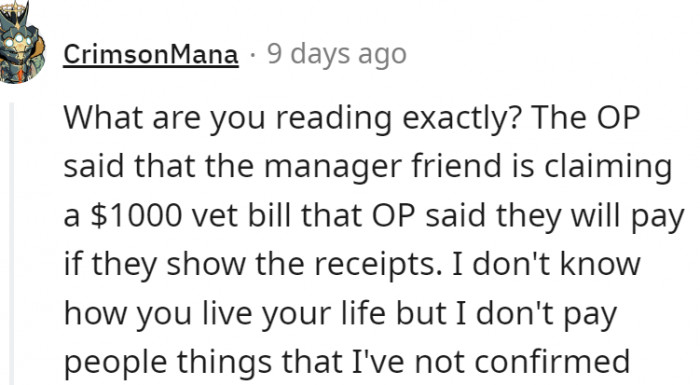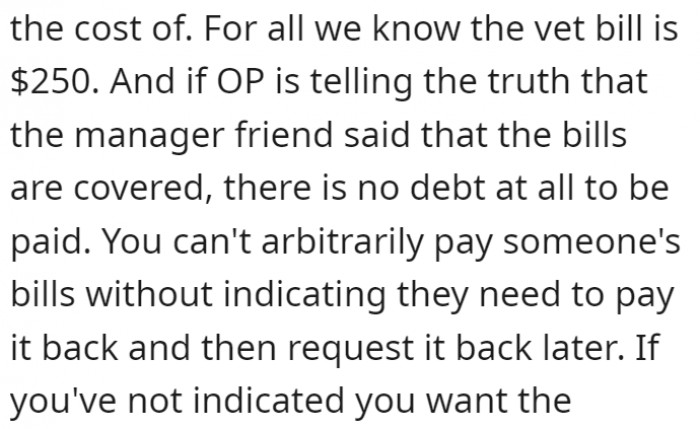Redditor Accepts Help With Vet Bills From Friend, Now They Want To Keep The Dog As Payment
When someone does a favor for you, it's important to be aware that there can sometimes be a cost attached. This cost can be emotional, financial, or time-related.
For example, if a friend helps you move, they may expect that you will return the favor in the future. Therefore, it is important to discuss any expectations when agreeing to a favor so that both parties understand the terms of the agreement.
We have one of those stories today. OP recently went through an eviction due to a feud with their landlord over code violations. A manager at their home bar offered OP, their child, and their dog a temporary place to stay.
The manager's friend helped get the dog into a vet to treat her dermatitis issues and stated that the bills were covered. OP and their family stayed for a month and a half but then decided to house-sit for a friend while applying for properties.
Upon informing the manager's friend that they would be leaving, the manager demanded to keep the dog until the allergies were healed and accused OP of being unable to care for the dog. OP received threatening and harassing texts from the manager's friend and some screaming phone calls from the manager's friend's coworkers.
They demanded that OP surrender the dog or pay over $1,000 in vet bills. OP asked for the bills but was then banned from the bar and faced issues with art vendors and others in the neighboring bar that they run.
OP asks:

OP recently went through an eviction due to feuding with their landlord over code violations

A manager at their home bar offered OP, their kid, and their dog a temporary place to stay.

The Dynamics of Reciprocity
According to social exchange theory, individuals weigh the costs and benefits of their relationships, often seeking balance in reciprocity.
Dr. John Thibaut and Harold Kelley, pioneers in this field, emphasize that perceived inequity can lead to dissatisfaction and conflict.
In the case of the Redditor, the expectations surrounding the vet bills may reveal underlying tensions about fairness and obligation. Recognizing these dynamics can facilitate healthier communication about expectations and help prevent misunderstandings.
Understanding Emotional Manipulation
Dr. George Simon, a clinical psychologist, identifies emotional manipulation as a tactic often employed in interpersonal conflicts. His research emphasizes that understanding the motivations behind such behaviors is crucial for effective resolution.
The harassing texts may reflect a deeper fear of abandonment or loss of control. Recognizing this can empower the recipient to respond calmly, breaking the cycle of manipulation.
Establishing clear boundaries and fostering open communication can significantly mitigate these behaviors.
The Emotional Weight of Financial Agreements
Financial arrangements among friends can often lead to unexpected emotional tensions. Research from the National Bureau of Economic Research shows that financial transactions between friends can complicate relationships, leading to feelings of obligation and resentment.
Dr. Richard Thaler, a pioneer in behavioral economics, emphasizes that financial decisions are often influenced by psychological factors, including social norms and perceived fairness.
The manager's friend helped get the dog into a vet to treat her dermatitis issues and said the bills were covered.

Upon telling the manager's friend they would be leaving, the manager demanded to keep the dog until the allergies were healed and accused OP of not being able to care for the dog.

OP received threatening and harassing texts and phone calls

Research indicates that emotional responses to perceived threats can escalate quickly, especially in close relationships. A study by Dr. John Gottman at the University of Washington shows that negative communication patterns can lead to emotional flooding.
In the situation described, the harassing texts may stem from feelings of betrayal or fear of loss. Understanding these dynamics can help both parties address grievances without escalating the conflict.
In this scenario, the sender's feelings of being threatened may indicate underlying issues of trust and boundary-setting in the friendship.
Studies show that clear communication about expectations can significantly reduce misunderstandings in financial matters.
OP has offered the following explanation for why they think they might be the asshole:

This is a good question:

OP responded:

The Role of Conflict Resolution Skills
Effective conflict resolution is essential for maintaining healthy relationships. Research by Dr. William Ury, co-founder of the Harvard Negotiation Project, emphasizes the importance of finding common ground.
His work suggests that employing active listening and empathic responses can diffuse tension. In this scenario, both parties could benefit from discussing their needs and feelings openly, which may lead to a more amicable solution.
Practicing these skills not only resolves the current situation but also strengthens future interactions.
Navigating Friendships with Financial Obligations
Setting clear boundaries around financial transactions can help maintain healthy friendships. Research indicates that establishing explicit agreements can prevent conflicts and foster mutual respect.
Encouraging open dialogues about finances can also enhance transparency and trust among friends.
This Redditor asks:

The manager does not want to show the bills

When you don't specify that you want the money back, it can be considered a gift

According to Dr. Brené Brown, a leading researcher on vulnerability, the fear of rejection can drive people to act defensively. In this case, the friend may feel threatened by losing the dog, interpreting the situation as a personal loss.
Brown's work highlights the importance of openness and honesty in relationships. By creating a supportive environment for dialogue, both individuals can express their feelings without resorting to intimidation tactics.
Moreover, seeking third-party mediation can provide additional support in resolving financial disputes. Studies in conflict resolution highlight that neutral mediators can facilitate constructive conversations and help restore trust.
Creating a framework for discussing money can empower friends to navigate their financial obligations more effectively.
You should be careful when receiving monetary help because sometimes the other party can view it as a loan and expect repayment. Therefore, it's important to ensure that both parties agree to the terms of the transaction before accepting the money.
Additionally, be sure to document the transaction to ensure that both parties have a record of what was agreed upon. Also, the other party may suddenly start thinking of it as a loan if you have a fallout in your relationship.
So, it is crucial to be aware of the consequences and be prepared for any eventuality.
Psychological Analysis
This situation underscores how financial agreements can complicate personal relationships.
Understanding the emotional dynamics involved can help friends navigate these challenges more effectively.
Analysis generated by AI
Analysis & Alternative Approaches
Addressing financial issues among friends requires clear communication and boundaries.
Research consistently shows that fostering transparency and mutual respect can lead to healthier and more fulfilling friendships.
Moving Forward: Actionable Steps
The complexity of interpersonal relationships often reveals underlying psychological principles that govern our actions and reactions. Insights from social exchange theory, emotional vulnerability, and conflict resolution can help navigate challenging situations.
Establishing clear communication and understanding the motivations behind behaviors can create opportunities for healing and growth. Ultimately, fostering empathy and accountability in relationships can lead to more satisfying interactions and healthier boundaries.



